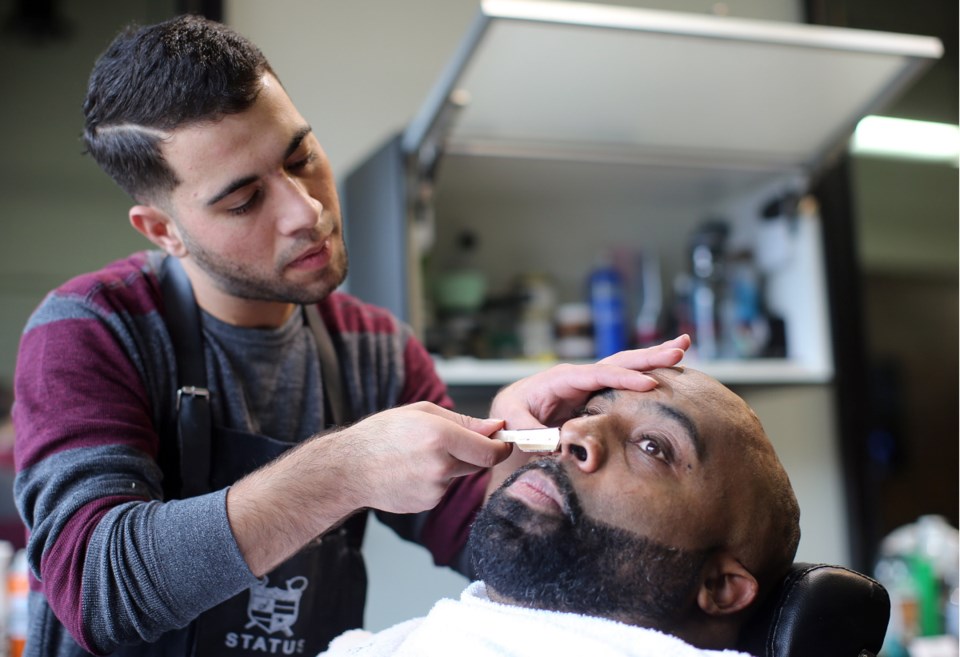When Hani Shehab learned to cut hair in a Syrian prison as a teenager, he had no idea it would help him land his first job in a faraway place called Victoria.
“There was a barber there. I watched him,” said Shehab, 22, at Status Barber Shop at Vancouver and Yates streets, where he works part-time. Shehab spent a year in a prison after an attempt to flee the bombing in his home city Homs. “I started cutting hair. I cut a lot of hair there,” he said.
Shehab is one of 350 Syrian refugees to come to Victoria in the past year under community and government sponsorship. The total is expected to be 500 by 2017.
All of the refugees are given financial and social supports for one year or until they are self-sufficient, whichever happens first. For many, such as Shehab, that year is coming up and having a job and community support network has been a lifeline.
“I am so thankful for the sponsorship help, to get work and teach me [the] language,” Shehab said. “It’s like my family here.”
Shehab arrived in Victoria on New Year’s Eve. He came from Lebanon, where he lived with his mother and siblings after crossing the border from Syrian on foot.
He was sponsored by a group of local women through the federal government and United Nations refugee resettlement program. Margie Parikh said last fall she was on a ski trip with friends when the topic of Syrian refugees coming to Canada came up.
“We said, ‘here we are, a group of privileged professional women. We can do something,’ ” she said. The group decided to skip a big fundraising campaign and come up with the $30,000 pledge needed to become refugee sponsors themselves. “We told the [Inter-Cultural Association] we would take anybody and had enough pledged for a family,” Parikh said. “But they told us it was hardest to find sponsors for single men.”
When Shehab arrived, he didn’t speak much English and only knew Victoria through Google searches and one fellow telling him it was the best place in Canada. A language program at the ICA and living at his sponsors’ homes improved his skills quickly.
“Our intention was to get him his own housing because we thought that’s what he’d want, but was afraid at the thought of living alone,” said Parikh. “Which makes sense coming from a big family.”
In May, one of the women in the group approached her son’s barber, Status Barbershop owner Troy Wilson, about helping Shehab. She knew he cut hair in Syria and Lebanon, but needed more opportunities to speak English and learn about the local culture.
“We set up a meeting and I realized it was a big job with the language barrier. But he was very pleasant and had a kind demeanour,” said Wilson. “His technique was different so I knew it would be a risk, but he was such an eager learner.”
Wilson mentored Shehab, initially communicating hair styles through photos and basic English.
“At first, people would come in and he’d say, ‘I cut you?’ Wilson said laughing with Shehab. “The word I kept telling him at the beginning was ‘patience,’ ” he said. Wilson often drove Shehab home and the two would role-play customer interactions to help him learn how Canadians chat.
“There is no better place to learn English than a barber shop,” Wilson said. Now that Shehab is studying English full-time at Camosun College, he works three days a week at Status, and also comes in to study. “We take turns helping him with his homework in the back,” Wilson said.
Shehab said he’s grateful for his job and friends at the shop. He’s become the resident straight-razor shave expert, even teaching his peers. “I learn many new things, styles and textures,” he said. While he’s enjoying life in Victoria, mentoring Syrian kids in soccer, ski trips and eating salmon, he misses his family.
But he might get to see them soon. The same group of women who sponsored Shehab is bringing his mother, father and younger brother here in the new year.
Both Parikh and Wilson said knowing Shehab and helping him and his family has been a gift to them and their families.



